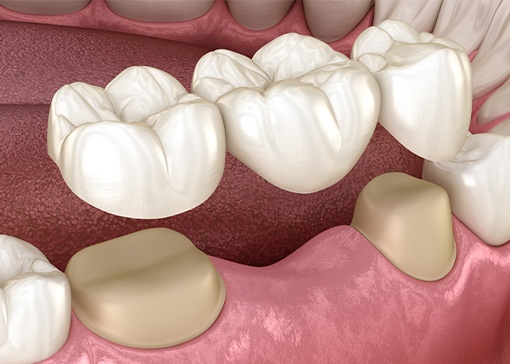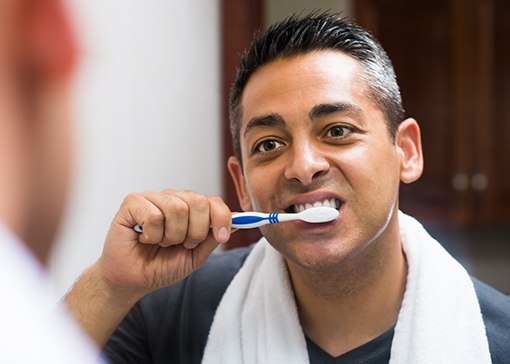Dental Bridges – North Andover, MA
Filling the Gaps in Your Grin
Your teeth work in unison to maintain their position and overall functionality. Therefore, when any of them are absent, it affects the entire set. For situations where three or more teeth are missing consecutively, Dr. Beliveau has the perfect solution: dental bridges in our North Andover, MA dental office. Not only will it restore your functionality, but it will also leave you with a beautiful smile.
Why Choose E. Charles Beliveau, DDS for Dental Bridges?
- Long-Lasting, Beautiful Materials
- Dentist with Decades of Experience
- Detail-Oriented Personalized Dentistry
What is a Fixed Bridge?

A fixed bridge is a relatively fast yet effective solution to the loss of three or more consecutive teeth. The procedure, which typically takes only a few weeks to complete, consists of the placement of a single fixture that holds three or more tooth-colored porcelain crowns.
It’s held in place by the adjacent teeth acting as abutments (anchors). To prepare them, Dr. Beliveau will remove a thin layer of enamel to ensure the best fit. Then using dental cement, the bridge will be secured in place.
Am I a Good Candidate for a Fixed Bridge?

The fixed bridge option is especially attractive to patients who’re looking for a non-invasive form of restoration, and it also accommodates those who’ve suffered from bone degeneration due to prolonged tooth loss.
The path to having your missing teeth restored starts by visiting your dentist in North Andover for an examination and consultation. While you’re there, the dental bridge procedure will be explained in detail so you can make an educated decision.
What are the Benefits of Fixed Bridges?

Dental bridges in North Andover yield immediate results. Here are some of the advantages you’ll notice:
- You’ll once again be able to eat many of the foods you love.
- The unwanted effects of shifting and bone degeneration can be prevented.
- You won’t have to worry about your facial structure collapsing, which can leave you looking older.
- You can expect greater confidence with your missing teeth being restored in an aesthetically pleasing manner.
How do I Care for a Fixed Bridge?

The maintenance of your fixed bridge is relatively simple. A basic rule of thumb is to practice the same care and caution that you would with your existing teeth. That means you should be brushing and flossing at least two times a day to prevent the growth of bacteria that could compromise your new bridge.
You should also avoid chewing ice, biting your fingernails or attempting to open packages using your teeth. The result can be a damaged fixture, and it can also lead to a dental emergency.
Another issue that can be problematic is teeth grinding, which is referred to as bruxism. The uneven distribution of tension can cause your bridge to prematurely fail. If you suspect you have this condition, then it’s a good idea to bring it to Dr. Beliveau’s attention before your new bridge is placed.
You’ll also want to stay away from brittle foods and hard candy, and your teeth should never be used as tools. So instead of trying to pry a package open with your teeth, take the safe route and grab an object better suited for the job.
By receiving a fixed bridge from Dr. Beliveau and adhering to the above guidelines, you can enjoy your beautifully restored smile for years to come. Contact our dental office to schedule a visit today!
Dental Bridges FAQs
Get answers to some of the most common questions about bridges in North Andover here!
Does Getting a Dental Bridge Hurt?
To prepare your abutment teeth for a dental bridge, we will need to reduce them, but you shouldn’t feel any of the work we do. Before we touch these teeth, we’ll give you an anesthetic, which will numb the area. As a result, you should remain comfortable throughout the entire process. You may have some sensitivity after the local anesthetic wears off, but it should subside after a day or two. Otherwise, your dental bridge should look and feel natural in your mouth.
Can I Remove a Dental Bridge?
Sometimes people can confuse bridges and partial dentures, but these restorations are fundamentally different. While a partial denture is easily removeable, bridges are permanently fixed to teeth or implant posts, which give them stability and strength. Many patients like that bridges are so secure! Never try to take your bridge out on your own, and if you need your bridge removed for some reason, you will need to talk to Dr. Beliveau.
Can I Anchor My Dental Bridge to Dental Implants?
Yes! A dental bridge can attach to either a natural tooth or an implant post. If you have three or more lost teeth in a row, implants are a great option because they keep the jawbone from deteriorating and don’t involve altering your natural teeth at all. To see if implants are a good choice for your bridge, you’ll need to meet with Dr. Beliveau in a consultation. Together, you can create a completely customized plan for your smile.
How Long Do Dental Bridges Last?
Bridges tend to go longer than traditional dentures. While dentures must be replaced about every five years, bridges can last for a decade or more before needing replacement. Much of your bridge’s lifespan will depend on how diligently you care for it. Keep in mind that maintenance looks similar to taking care of real teeth. Daily brushing and flossing, as well as regular checkups at our office, are the main care needed to keep bridges in good working condition.
